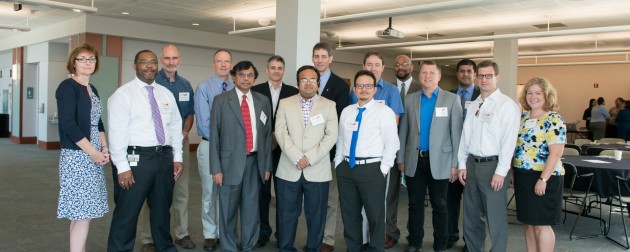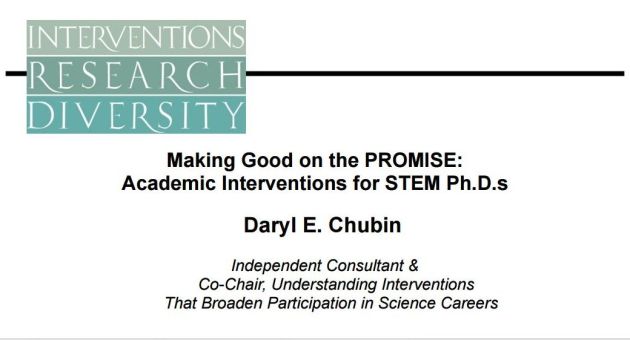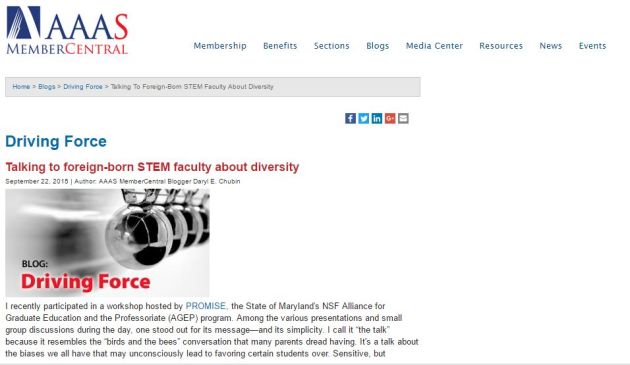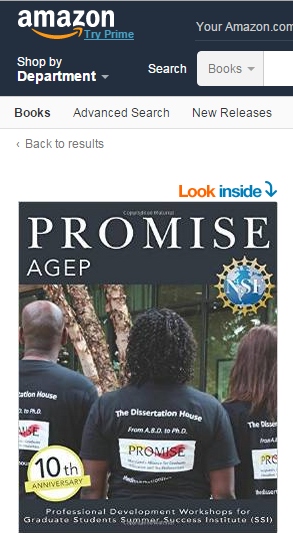This page provides resources that faculty can use to learn more about diversity in STEM, and tools that shape the PROMISE AGEP. The PROMISE AGEP was established to increase the numbers and diversity of Ph.D.s in STEM fields, with the purpose of preparing diverse graduate students and postdoctoral scholars for the STEM professoriate.
In September 2015, STEM faculty from UMB, UMBC, and UMCP were recognized as “PROMISE Mentors” after receiving nominations from graduate students and administrators. The 12 faculty members participated in a workshop on broadening participation in STEM, along with deans from the schools around the University System of Maryland. The article detailing the event can be found here: http://news.umbc.edu/workshop-examines-diversity-in-stem-graduate-education/
The Mentors are as follows:

UMB:
Dr. Joseph Stains – physiology
Dr. Eileen Barry – microbiology and immunology
Dr. Denise Orwig – epidemiology
Dr. Jacques Ravel – genomics
UM College Park:
Dr. Jeffrey Herrmann – mechanical engineering
Dr. Hugh Bruck – mechanical engineering
Dr. Jeffrey Klauda – chemical and biomolecular engineering
Dr. Sreeramurthy Ankem – materials science and engineering
UMBC:
Dr. Kathleen Hoffman – mathematics
Dr. Stephen Miller – biological sciences
Dr. Ravi Kuber – information systems
Dr. Carlos Romero-Talamas – mechanical engineering
Additional faculty who have engaged in work on diversity and were also invited to be recognized and contribute to the conversation included:
Dr. Michael Summers (biochemistry, UMBC)
Dr. Tim Oates (computer science and electrical engineering, UMBC)
Dr. Shawn Bediako (psychology, UMBC)
Dr. David Tilley (environmental sciences and technology, UMCP)
Dr. Siddhartha Das (mechanical engineering, UMCP)
Dr. Bret Hassel (microbiology & immunology, UMB)
Dr. Eduardo Davila (microbiology & immunology, UMB)
Dr. Greg Carey (microbiology & immunology, UMB).
 Dr. Daryl E. Chubin, keynote speaker for the workshop, presented on the topic: Making Good on the PROMISE: Academic Interventions for STEM Ph.D.s. Dr. Daryl E. Chubin, who served in leadership positions at the American Association for the Advancement of Science, the National Science Foundation, and the White House, serves on the External Advisory Board for PROMISE: Maryland’s Alliance for Graduate Education and the Professoriate (AGEP), sponsored by the National Science Foundation. His training materials can be found below, and can be accessed by clicking the images.
Dr. Daryl E. Chubin, keynote speaker for the workshop, presented on the topic: Making Good on the PROMISE: Academic Interventions for STEM Ph.D.s. Dr. Daryl E. Chubin, who served in leadership positions at the American Association for the Advancement of Science, the National Science Foundation, and the White House, serves on the External Advisory Board for PROMISE: Maryland’s Alliance for Graduate Education and the Professoriate (AGEP), sponsored by the National Science Foundation. His training materials can be found below, and can be accessed by clicking the images.
1. SLIDES: Making Good on the PROMISE: Academic Interventions for STEM Ph.D.s.
PROMISE-AGEP External Advisory Board Meeting and Workshop on Enhancing Faculty Understanding of Diversity Issues in Graduate and Postdoctoral Education
By Daryl E. Chubin
September 11, 2015
Abstract:
This slide presentation tells a story of current challenges to STEM PhD-granting institutions, departments, and educators. It draws on the presenter’s federal and nonprofit policy experience, as Center Director at the American Association for the Advancement of Science, and as a consultant to university clients.
National data and perspectives are offered as inputs for local actions that prepare doctoral students for an uncertain academic job market. The presentation should provoke discussion of variations by discipline, race/ethnicity, and gender, and the tailoring of strategies to anticipate legal, financial, and workplace biases. All of these affect career prospects.
The presentation concludes with suggestions for guiding interventions that are practical and effective. These will be subsequently be discussed in small groups and the slides will be available.
Select Topics Examined in the Slides:
- Context
- Faculty Demographics & PhD Completion Disaggregated
- Gender & Discipline
- Legal Matters
- Debt & Support
- The Academic Market & Workplace
- Interventions: What You Can Do
- Other Resources
Excerpt from page 33:
Assessing Student Preparation for the Professoriate
Each STEM graduate program should collect and maintain quantitative and qualitative data for students focusing on activities related to preparation for the professoriate, leading to demonstrated competence in:
• Writing papers for peer-reviewed journals and preparing patent applications,
including understanding how journal articles and patent applications are
reviewed.
• Grant writing and management.
• Teaching and learning, including: understanding research on teaching and
learning; how to develop curriculum and student assessments; use of student
centered teaching strategies; use of technology for classroom management and
teaching; and issues of adult learning and cognition.
• STEM student career counseling and advising, including advising and mentoring
across cultural and sex lines and mentoring students with disabilities.
• Managing a research laboratory and teams, including understanding research
ethics.
• University citizenship, including: understanding types of universities;
requirements for promotion and tenure; navigating departmental politics; and
time management skills for balancing time for teaching, research, service—and
life (italics added).
source: Measuring Diversity: An Evaluation guide for STEM Graduate School Leaders, 2011, http://www.nsfagep.org/
2. ARTICLE: Talking to foreign-born STEM faculty about diversity
The article, Talking to foreign-born STEM faculty about diversity, is located here on the AAAS website.
3. VIDEO: Dr. Daryl E. Chubin, Sept. 15, 2015
Dr. Chubin’s talk: “Making Good on the PROMISE: Academic Interventions for STEM Ph.D.s” is featured here. The introduction is presented by Dr. Janet C. Rutledge, Vice Provost for Graduate Education and Dean of the Graduate School at UMBC.
More about Dr. Chubin:
Daryl E. Chubin – Leading the Way – Mythbuster (WEPAN – Women in Engineering ProActive Network article.)
Dr. Daryl E. Chubin – BioSketch/Profile
Dr. Daryl E. Chubin’s 110+ Publications
4. Resources and Statistics from the Council of Graduate Schools (CGS)
a. Supplement to the DIMAC Study
Okahana, H., Allum, J., Felder, P. P., and Tull, R. G. (2016). Data Sources PLUS: Implications for Practice and Research from Doctoral Initiative on Minority Attrition and Completion. The Council of Graduate Schools (CGS Online Publication: http://cgsnet.org/data-sources-plus-implications-practice-and-research-doctoral-initiative-minority-attrition-and).
b. Case study showcasing 10 “Lessons Learned: Shepherding Doctoral Students to Degree Completion,” made possible with support from the (CGS)/Peterson’s Award for Promoting an Inclusive Graduate Community, and a grant from the National Science Foundation’s Presidential Awards for Excellence in Science, Mathematics and Engineering Mentoring (PAESMEM) program.
The University as Mentor – Council of Graduate Schools’ Publication
5. Resources from the PROMISE Director (R.G. Tull):
The Mentor Mirror is a “reverse” individual development plan (IDP) for the advisors of graduate students and postdoctoral fellows. The traditional IDP is focused on the actions of the student/mentee. This document allows the professor/advisor/mentor to reflect upon her/his goals for the mentee’s success. The full explanation can be found here: https://renettatull.wordpress.com/2015/11/06/the-mentor-mirror-a-reverse-idp-for-mentors-srebdocschomotempowered-thinkbigdiversity/.
The Mentor Mirror (PDF Download Available). Available from: https://www.researchgate.net/publication/283517238_The_Mentor_Mirror
b. Engineering PhDs & Diversity in the U.S. – Disparity by the Numbers: 129 out of 3,926 #THINKBIGDIVERSITY
Blog post by Renetta Tull: https://renettatull.wordpress.com/2015/10/07/engineering-phds-diversity-in-the-u-s-disparity-by-the-numbers-129-out-of-3926-thinkbigdiversity/
6. The PROMISE Papers and Critical Publications that Shape PROMISE
a. Publications list (comprehensive)
https://promiseagep.wordpress.com/publications/
b. The PROMISE Paper
Tull, R. G., Rutledge, J.C., Warnick, J. W., & Carter, F. D. (2012). PROMISE: Maryland’s Alliance for Graduate Education and the Professoriate Enhances Recruitment and Retention of Underrepresented Minority Graduate Students. Academic Medicine, 87(11), p. 1562-1569.
c. The Jessica Effect
Tull, R.G., Ordóñez, F. C., Zayas, Z., Byars-Winston, A., & Cortes-Rodriguez, M. (2014). The Jessica effect: valuing cultural and familial connections to broaden success in academe. AAC&U Peer Review, 16, 13.
d. The importance of involving students from all disciplines in STEM support programs
Tull, R. G., Williams, A. Y., & Hester, S. (2015). An NSF AGEP Program’s Unintended Effect on Broadening Participation: Transforming “Non-STEM” Graduate Students into Engineering Education Faculty, Researchers, K-12 Educators, and Advocates. Paper presented at the American Society for Engineering Education(ASEE): 122nd ASEE Annual Conference Exposition, Seattle, WA: American Society for Engineering Education.
e. The PROMISE Professional Development Book can be purchased on Amazon, PROMISE AGEP: Professional Development Workshops for Graduate Students Summer Success Institute (SSI)








